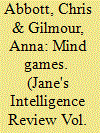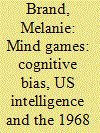| Srl | Item |
| 1 |
ID:
138565


|
|
|
|
|
| Summary/Abstract |
Alexander Dugin, the Russian philosopher and political activist, has attracted sporadic coverage in English-language publications over the past year. He is an engaging figure—prolific, radical, bearded, equally at home in university seminars and posing with tanks in South Ossetia and eastern Ukraine. So adept at self-promotion that he is sometimes not taken as seriously as he should be, Dugin is the intellectual who has Vladimir Putin’s back in the emerging ideological conflict between Russia and the West. At home, Putin uses him to create a nationalist, anti-liberal voting bloc, while abroad Dugin is the lynchpin of numerous irregular networks of anti-liberal political resistance and sabotage. No individual better represents the tactics of the current Russian regime.
|
|
|
|
|
|
|
|
|
|
|
|
|
|
|
|
| 2 |
ID:
099468


|
|
|
| 3 |
ID:
166780


|
|
|
|
|
| Summary/Abstract |
This article examines the impact of cognitive bias on the analytic output of the United States intelligence community during the Prague Spring. Utilising a range of primary sources, including declassified documents, oral history and contemporary accounts, this article argues that as a result of heuristic biases, analysts formed the mindset that the Soviet Union would not invade Czechoslovakia, and did not alter that assumption in the face of increasing evidence to the contrary. Consequently analysts possessed a distorted understanding of both Soviet intentions and the prevailing political environment and did not accurately convey the likelihood of military action to consumers.
|
|
|
|
|
|
|
|
|
|
|
|
|
|
|
|